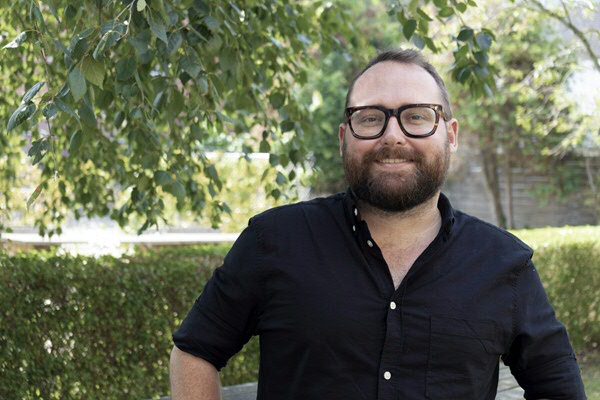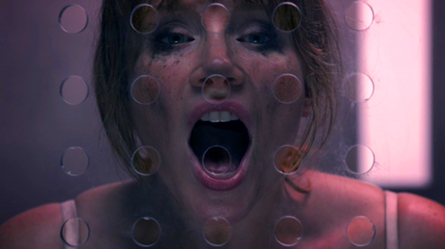Smart cities: doom or dream scenario?

Dr Ryan Wittingslow from University College Groningen (UCG) is a man with a loud laugh and many talents. On closer scrutiny, you’ll discover that he operates on the cutting edge of philosophy, technology, aesthetics, urban studies and the history of science. But who is he, why is he so interested in smart cities and how did he get here from Sydney?
Text and photos: Merel Weijer / Communications department
On honeymoon
By accident. That’s how he ended up in Groningen. He got married, resigned from his job and went on honeymoon to Europe. While travelling, he applied for a few jobs as he was keen to work in Europe. On arrival in Basel, he found an invitation to an interview at UCG. He’s not sure whether it was his excellent CV or his roaring laugh that tipped the scales, but he was offered a position as Assistant Professor of Aesthetics. It’s a great job, but the title comes nowhere near to describing all of his duties and interests.
The smell of oranges
Wittingslow is more interested in philosophy than technology, even though his research focuses on ‘smart cities’. These are cities that are fitted out with all kinds of cunning technology such as cameras, microphones and sensors that can track people’s bodies. The technology, and the data it provides, improve the efficiency of the cities. The Netherlands boasts a few of the smartest cities in the world. Groningen is one of them, but Eindhoven tops the list. Anyone out for a night in the Stratumseind, the city’s party street, is tracked via the public address of their telephone. Their movements are linked to data from cameras and microphones, allowing the authorities to see when a situation becomes dangerous or if a fight is likely to break out. Philips supplies the Municipality with ‘hue lights’ (lights that change colour), as research has shown that changing the colour of the light can make people less aggressive. Another study, which revealed that people calm down if they smell oranges, was set aside. ‘Apparently, we think that spraying people is going a bit too far,’ explains Wittingslow before one of his typical guffaws.

Political
The new technology is intended to make it safer for people to go out at night. So what’s not to like? According to Wittingslow, the means to this particular end is not without problems. The designers and producers of the systems do not consult with each other, for example. And the systems are not made with a worst-case scenario in mind. To the designers, they are simply appliances. But when these appliances appear in the public domain, they suddenly become political. ‘It's fine as long as your government is not hostile towards its population, but if the situation changes and you want to revolt, you may find that the technology works against you.’ China, for example, is way ahead of the field when it comes to developing technology for monitoring and controlling. The Chinese government hopes to have a social credit system in place for its entire population of 1.3 billion people by 2020. Points will be awarded and deducted for people’s credit ratings and contractual compliance, as well as for their behaviour and friendships.
Park benches with or without armrests?
Most people are blissfully unaware of the things that are designed and used for the public domain. Wittingslow cites park benches as an example of how a simple commodity can take on political undertones. Park benches belong in public spaces (which are implicitly open) and must be accessible to all. But in our cities, more and more benches are being designed with an armrest in the middle to stop people from lying on them. So in a nutshell, homeless people may no longer sleep in public spaces. ‘This infringes on people’s freedom and gives ‘the thing’ political implications. An innocent object like a park bench suddenly becomes an important issue in a fundamentally political and ethical debate. Some cities in the USA and Canada are protesting about this and removing the armrests, or designing benches without armrests, so that people can lie on them.’
Opening up the mind
Wittingslow’s aim is not to encourage students to protest, but to teach them to be vigilant and critical. He puts this into practice in the Exploring Challenges of Modern Societies course unit, for example. Students explore a topical challenge (such as climate change) and lectures are based on a range of disciplines, including natural and life sciences, economics, psychology, the arts and philosophy. Philosophy is Wittingslow’s favourite area and he challenges his students to think about the extent of their obligations to future generations. ‘How responsible should I feel for the suffering that my current use of plastic will cause to people in the future, for example? Would future generations be justified in being angry with me?’ These questions regard moral actions and claims relating to time. The students don’t have to find answers. ‘I just want them to open up their minds.’

Doom or dream scenario?
Wittingslow sees the Netflix science fiction series Black Mirror as a good diagnosis of anxiety within a society. ‘Pessimistic? Yes. But pessimism is a useful tool. It makes people more critical. Morbid? Yes, but it gets people thinking.’ And that’s what he wants to instil in his students. There is no right or wrong, including when it comes to developing new technology. Whether we like it or not, technological progress is here to stay. Wittingslow believes that the important thing is to keep an open, critical mind. ‘Look at what’s going on, be aware of what’s happening and why. Don’t just follow the herd. Make designers and producers work together. Involve the public, your customers or residents in what is being developed and how it is being used. And never assume a best-case scenario. In theory, smart cities represent real progress, but you should always bear the possibility of a doom scenario in mind.’
Dr. Ryan Wittingslow: https://www.rug.nl/staff/r.m.wittingslow/
Video: https://www.youtube.com/watch?v=FwwdNTYp6to
Video: https://www.youtube.com/watch?v=DWhcWQQjaYM
| Last modified: | 28 April 2020 1.44 p.m. |
More news
-
11 December 2023
Join the 'Language and AI' community
As a part of the Jantina Tammes School, the 'Language and AI' theme is an interdisciplinary initiative that aims to encourage collaboration among academics, PhD candidates, students, and industry representatives who share a keen interest in the...
-
15 May 2023
Impact: 'The Good, the Bad, and the Necessary' of sexual education
In the coming weeks the nominees for the Ben Feringa Impact Award (BFIA) 2023 will introduce themselves and their impactful research or project. This week in the category student: The student team behind the Sexual Wellness Education Initiative...
